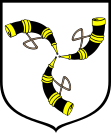Dukla (Poland)
| Dukla | ||
|---|---|---|

|
|
|
| Basic data | ||
| State : | Poland | |
| Voivodeship : | Subcarpathian | |
| Powiat : | Krośnieński | |
| Gmina : | Dukla | |
| Geographic location : | 49 ° 34 ' N , 21 ° 41' E | |
| Residents : | 2126 (Dec. 31, 2016) | |
| Postal code : | 38-450 | |
| Telephone code : | (+48) 13 | |
| License plate : | RKR | |
| Economy and Transport | ||
| Street : | Droga krajowa 9 | |
| DW993 | ||
| Next international airport : | Rzeszów-Jasionka | |
Dukla is a small town in the Powiat Krośnieński in the Subcarpathian Voivodeship in Poland . It is the seat of the town-and-country municipality of the same name with around 14,700 inhabitants.
location
The city lies on the Jasiołka , a tributary of the Wisłok , 17 km south of Krosno . Again 17 kilometers south of Dukla, the Duklapass leads over the Carpathians . The DK9 , which is part of the European route 371 , runs through Dukla .
history
Until 1939
Dukla is first documented as a village around 1355. The founding privilege of a city under Magdeburg law in the village of Dukla was issued in 1380. In 1474, Dukla was captured, looted and burned down by the Hungarians. The city did not recover from this destruction until the 16th century when the Hungarian-Polish trade flourished. In 1540 Dukla was privileged with a weekly market and a biannual fair.
There is evidence of a Jewish community in Dukla as early as the 16th century. The boom in trade in the 19th century allowed the Jewish community to grow and prosper, so that in 1900 of 3,213 Duklas inhabitants 2539 were Jews, Dukla at that time was a Jewish town ( shtetl ).
See also: Synagogue (Dukla)
Trade in Dukla began to decline in the 19th century with the construction of a railway line across the Carpathian Mountains. Furthermore, the First World War brought great destruction. Finally, with Poland's independence in 1918, trade between Galicia and Poland was further reduced. The destruction of the First World War and a pogrom in 1918 made prosperity disappear and drove many Jews from Duklas to emigration.
1939-1945
The decline was followed by destruction when Dukla was occupied by the Wehrmacht on September 8, 1939. The usual increase in thefts, reprisals, mistreatment and murders followed. Most of those affected were able to evade the attempt to force the Jews who were unable to work to cross the border on the San into the Soviet-occupied area . Those who obeyed the order were later deported by the Russians, but, unlike those who had hidden and eventually returned to Dukla, survived.
On August 10, 1942, the Jewish residents were rounded up on the market square. Some were shot immediately, some were deported to the Belzec extermination camp , and some of the able-bodied men were interned in a labor camp in the city. There they had to work hard in stone quarries and building roads. After the labor camp was closed in December 1942, the survivors were transferred to the Rzeszów and Wola Duhacka camps .
Of the Jewish population, around 150 survived the Holocaust , 100 of them in the Soviet Union .

1945 until today
From 1975 to 1998 Dukla was part of the Krosno Voivodeship .
Dukla belongs to the Diocese of Krakow . On June 9, 1997, Pope John Paul II visited Dukla. On June 10, 1997, John Paul II canonized the Franciscan minister John von Dukla, born in 1414, in Krosno .
local community
The urban and rural community (gmina miejsko-wiejska) Dukla has an area of 233.5 km².
Economy and tourism
The timber industry was an essential branch of industry after the war.
Dukla is on the E8 European long-distance hiking trail . This hiking trail ( ![]() ) leads from Bardejov via Iwonicz-Zdrój , the Pasmo Bukowicy and Wołosate ridge to the Ukraine .
) leads from Bardejov via Iwonicz-Zdrój , the Pasmo Bukowicy and Wołosate ridge to the Ukraine .
Trivia
The city of Dukla forms the backdrop for the novel by Andrzej Stasiuk : “The world behind Dukla” .
sons and daughters of the town
- Johannes von Dukla (1414–1484), religious and priest
- Joseph Samuel Bloch (1850–1923), rabbi and member of the Reichsrat
- Jan Liwacz (1898–1980), blacksmith and prisoner of the Auschwitz I concentration camp
literature
- Bogdan Brzuszek: Johannes von Dukla (Prague). In: Biographisch-Bibliographisches Kirchenlexikon (BBKL). Volume 3, Bautz, Herzberg 1992, ISBN 3-88309-035-2 , Sp. 341-345.
Web links
Individual evidence
- ↑ Tomasz Jurek (editor): DUKLA STARA albo PRZEDMIEŚCIE DUKIELSKIE ( pl ) In: Słownik Historyczno-Geograficzny Ziem Polskich w Średniowieczu. Edycja elektroniczna . PAN . 2010-2016. Retrieved April 22, 2019.
- ↑ Tomasz Jurek (editor): DUKLA ( pl ) In: Słownik Historyczno-Geograficzny Ziem Polskich w Średniowieczu. Edycja elektroniczna . PAN . 2010-2016. Retrieved April 22, 2019.
- ↑ Dz.U. 1975 no 17 poz. 92 (Polish) (PDF file; 783 kB)
- ^ Andrzej Stasiuk : The world behind Dukla presentation by the publishing house Suhrkamp TB 3391, Berlin 2002, ISBN 978-3-518-39891-3 .

